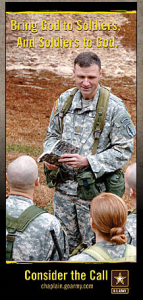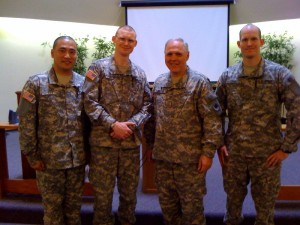Chaplain Reports on Proselytism at Army War College
Dr. Michael Milton is a Presbyterian minister and Army Reserve Chaplain who recently visited the Army War College “on behalf of the Reformed Theological Seminary.” In a March 2011 article titled, “The Prince of Peace at the U.S. Army War College.” He spoke about how, during his visit, he found Christ at the Installation, the Memorial Chapel, in the community, and in the people. The article seems intended to be a long compliment to the Army War College through the lens of a devout Christian. Chaplain Milton reported on Christian messaging not just in the Christian community, but also in the classroom.
The Military Association of Atheists & Freethinkers reaches out for support from the chaplaincy and has had success, but this article shows a good opportunity for the chaplaincy to police its own. Promotion of Christianity by senior officers creates an oppressive environment for non-Christians, thus it is important for MAAF to speak out on this issue. Chaplain Milton reports Christ being promoted by all personnel at the War College and specifically by one of the chaplains teaching students.
He (Jesus) is witnessed to in the community by the students, faculty, and staff of the War College … With a Southern Baptist minister, an Army chaplain, teaching ethics, Christ is present in the classroom. He is not forgotten or left out of discussions. Whether dealing with responses to the recent repeal of Don’t Ask, Don’t Tell, or the “Just War” theory, His teachings are not neglected in the make up of the faculty.
Dean of Academics William Johnsen, PhD, reached out to MAAF with his response to the article. He stated that Chaplain Milton visited Carlisle Barracks purely for a chapel-sponsored religious retreat and did not have any other access to the classroom or faculty. Chaplain Charles Reese prepares the core ethics course which is then approved by War College administrators and assigned to various faculty to teach. CH Reese operates purely as a faculty member only and has no formal duties with the War College chaplain’s office. Dr Johnsen rejected the general evangelistic accusations against the War College saying,
“Chaplain Milton’s report would be a significant charge that I deeply dispute. Faculty including chaplains are expected not to promote religious beliefs or activities in the classroom setting.”
The perspective of the War College Dean and Chaplain Milton are in opposition. Chaplain Milton may have had reports from the personnel he interacted with during the retreat, but he may also have overstated his role and access to faculty during the visit. It is also comforting to have the Dean of War College denounce the idea that his classrooms may be used as a platform for Christian evangelism.
Chaplain Milton himself quotes the Bible to outline his views of Christianity’s role in government. He sees government representatives, presumably military chaplains, as ordained to “use the sword” to promote the Christian Gospels. These kinds of accusations reinforce the calls for reforms at the War College. Violent, political Christianity has no place in military leadership instruction especially when promoted by a commissioned officer and prior chaplain college instructor.
St. Paul taught, in Romans 13, that human government, representatives of the people in a nation, are in fact “ministers” of God, ordained by God to use the sword to protect and to punish, for the good of all, and for the ongoing work of the Gospel.
In a more recent article, “Are You Called to be A Military Chaplain,” (reposted Jan 24, 2013) Dr. Milton expands on his own work as a chaplain. He says in no uncertain terms that he wants to go outside the church and proselytize the entire military community including families. Christian chaplains should minister to Christians, but they are not commissioned by the President and paid taxpayer money to try to convert “lost souls.” The Army chaplaincy website even reposted the article alongside the advertisement “Bring Soldiers to God” (advertisement pictured above). [Edit, Oct 2011: the official-looking site now features a disclaimer that it is not an official Army publication.]
I must preach the Gospel of Jesus Christ to my own nation and for my own nation. I must declare the faith of our fathers, the guiding light of our Pilgrim founders … not just to a congregation of those who will come through the doors of the church—but to soldiers, Marines, sailors, airmen, or guardsmen who cannot pass through the doors of the Church … and speak Jesus Christ into their lives and into the lives of their families … to lead lost souls in that mission field to Jesus Christ.
Chaplain Milton undeniably has a strong sense of patriotic duty, but his sense of professional boundaries in his chaplaincy seems to be entirely absent. He characterizes chaplains’ access to soldiers as a “hallowed open door” to evangelize the military. He taught a course on “expository preaching” at the Army Chaplain School in 2009 (pictured at the right. Hopefully this instruction did not include his “hallowed open door” theory. He speaks openly of a chaplains’ opportunities to proselytize and of his success in doing so.
This hallowed open door to speak forth the Word of the Lord often happens when the chaplain is exercising what we call “a ministry of presence;” just being there where the troops are … The military as an institution advocates for the serviceman or woman—enlisted or officer— to come to their chaplain. … And they do! … I shared Jesus Christ to everyone of those divine appointments and God allowed me to lead many of those who came that day to the Lord.
Chaplain Milton was doing many activities a chaplain would be expected to do. He preached about Christianity at church and on retreats. He wrote about seeing Christ wherever he looked. In the “Military Chaplain” article he tells a heartwarming story of how he inspired a couple to renew their marriage vows. He talks about sharing the gospel with those who ask, which is entirely different than his unconstitutional efforts to convert others to his personal faith through the special privilege, platform, and resources of the chaplaincy. Facilitating a vibrant community of Christians in churches and and for those Christians who ask is required; government officials promoting their personal religion is abuse of power.
MAAF maintains positive outreach, successfully collaborating with military leaders and chaplains in support of atheists and humanists, but in this instance, MAAF has a duty to highlight a chaplain who has clearly stepped beyond the boundaries of chaplain responsibilities. MAAF has a duty to highlight allegations of misconduct at the War College. Problems of Christian bias at these high levels necessarily ostracize non-Christians and should be addressed firmly with command action. Chaplain Milton’s deep faith and patriotism and the well-meaning majority of chaplains do not excuse the issues reported in Chaplain Milton’s blog. Maybe it is the case that Chaplain Milton is overstating his invitation to the War College and/or overstating what he saw. The Military Association of Atheists & Freethinkers asks Army leaders to investigate both the service of Chaplain Militon and his statements about Christian-based ethics instruction and general proselytism at the Army War College. Army leaders should speak against overt proselytism by War College faculty (whether or not it is occurring), stop any wrongdoing, and seriously question the actions and attitudes of Dr. Milton as an Army Chaplain.


